Friday, 30 April 2021
Engels on Capitalism and Morality
Check out the Acid Horizon comrades on YouTube and, if you're moved to support them, here's on Patreon. They donate a portion of their funds to mutual aid projects.
Wednesday, 28 April 2021
Jog On, Arlene
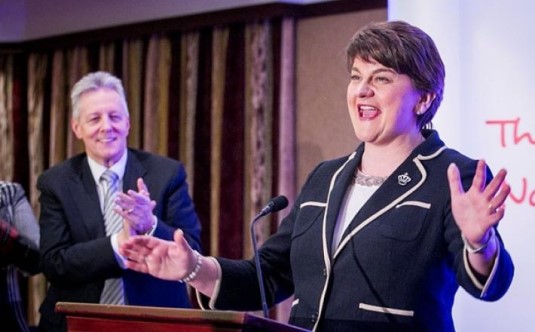
I'd put the house on the latter. According to the News Letter, not one but four round robin letters were in circulation calling for Foster's head. The contents make interesting reading. She's carrying the can for Westminster's imposition of abortion law on the North, a policy one letter changing hands between the DUP's councillors says must be "overthrown". Sorry guys, if you want to remain part of the United Kingdom then there are no special opt outs. There's the hullabaloo over the border in the Irish Sea, which Boris Johnson created, denied it existed, and still affects to only half-believe its presence. And somehow Foster is responsible for Sinn Fein ministers turning up at an IRA funeral last year, the ostensible catalyst for recent loyalist riots. As boss and First Minister of the six county statelet, Foster is formally responsible. But substantively? She's more a pawn of larger forces than the author of hers - and unionism's - destiny.
It was funny then to read Robert Peston's shot-from-the-hip as he speculated about the DUP after Foster. It could continue its path toward the centre of Northern Ireland's politics(!), or lurch to the right and spurn voters who might turn to Sinn Fein(!!). It's embarrassing. But perhaps the real reason for Foster's jaunty farewell was relief. The DUP are hemmed in by intractable problems. For some DUP players, they know the party's standing is menaced from the right - particularly the aggro-loyalist Traditional Unionist Voice - who've started chomping into their starboard flank. Having seen how Brexit ultraism did the business for the Tories, dumping Foster and taking a hard position on abortion, gay rights, and the Irish Sea border is, they think, the way to restore the party as the uncontested hegemon of official loyalism.
Peston might have showed his weak grasp of politics in the province, but his instinct is correct. With the DUP poised to heed the siren calls of Orange Order certitude, they are bleeding votes not to Sinn Fein but the centrist Alliance. Having emerged from within the loyalist community at the height of the Troubles, they spoke for the layer fed up with the overt sectarianism of the old Ulster Unionist Party and wanted to avoid the descent into civil war. More recently, it has successfully established itself as a break with the past, supporting remain during the referendum and providing an alternative to the unionist parties that doesn't go the whole hog into outright republicanism. If that wasn't bad enough, the Alliance's voters tend to be older and therefore more likely to turn out. It's not beyond the realms of possibility that come the 2022 elections, they and Sinn Fein could emerge as the largest parties and the so-called mainstream of loyalism is left out in the political cold by voters. The sectarian statelet without the sectarian forces having a say on the Executive, a bizarre eventuality just a few years ago is now a real possibility.
Whoever takes over from Foster has an incredibly difficult job to do. Writing snarky letters and talking the big man down the lodge is one thing, but facing up to the crisis of unionism is quite another. The Irish Sea border's not going anywhere, the party is pressured by electoral dangers to its left and right, and the political and cultural continuity of loyalism is visibly rotting. Unfortunately, as is usually the case when long-established movements are in decline, they tend to cling onto the fundamentals regardless of the wider damage this causes. With unionist mobs on the streets, historically high levels of support for a united Ireland, and an electoral eclipse just over the horizon, the consequences of the DUP's weakness are not going to be pretty.
Image Credit
Tuesday, 27 April 2021
How Radical is Biden?
In this episode of Downstream, Aaron Bastani speaks to Adam Tooze, the well known economist and historian of economics and asks just how much of a departure the Biden presidency is from establishment conventions of recent years.
Monday, 26 April 2021
Bringing Up the Bodies
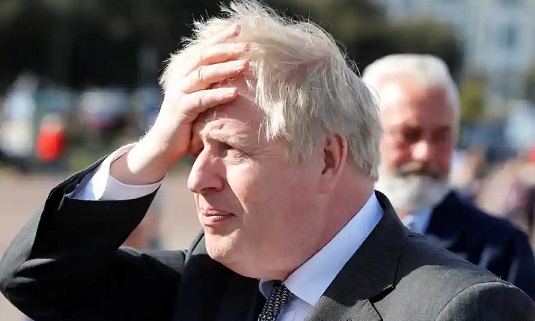
Did he really say it? The normally pliant and pliable Robert Peston affirms the story, digging up a couple more whisperers who are definitely not and have nothing to do with Dominic Cummings. The truth, however, doesn't matter at this point. Everyone knows Johnson's persistent foot-in-mouth disease makes it believable. It has enough truthiness, and that's what counts in politics. It's the sort of background music no party would like playing in the background.
Meanwhile, the persistence of Tory corruption has finally, it seems, taken a lump out of their poll ratings. The Evening Standard reports how they've lost five points in the space of the month. No consolation for Labour alas, who are also down by one. Could the Mail's scoop push the ratings down further while the rows about the PM's flat and everything else rumbles on?
For the first time, there is a real danger here for Johnson. The resilience of the Tories has been thanks to their politically astute management of the crisis. At each step, the government have keenly emphasised the lengths they've gone to to ensure supply of equipment, bed capacity, doses of vaccine, and the "unprecedented" emergency measures they've introduced. Measures, the more informed reader will know, that were pushed by Jeremy Corbyn before the Tories adopted them. Their visible activism was accompanied at all times by their concerted effort at depoliticising the crisis. Despite the late lockdowns, the carnage in our care homes, the collapse of test and trace, Johnson and co. have successfully taken the political sting out of their disastrous handling. They've managed this by turning the responsibility for infection onto the British people themselves. Transmission of the disease and all that follows is bad luck, an unfortunate individual happenstance. Or because one was acting irresponsibly and not following the guidelines. The viral footage of Hyde Park, of last summer's parties in the woods, and even a certain trip to Barnard Castle hammered home the same message. The politicians weren't as fault, even while they refused to mandate the closure of many unnecessary workplaces, it was a question of conduct and fortune. And, unfortunately, the official opposition have have allowed the Tories to play this merry game. Hopeless.
Why are the warning signs flashing? Because Johnson's indiscreet outburst threatens to blow open the entirety of the strategy. It's one thing to punt out a line about following the science and pleading good faith mistakes on the timing of the lockdowns. That helps the government escape responsibility. But if Johnson is found out for saying thousands of dead are a price worth paying for avoiding another lockdown, then the whole edifice of the pandemic looks less an honest response to unprecedented difficulties and more a deliberate contrivance riddled with hubris and fault. Deaths were preventable and Johnson did not care. True, by itself it might not be damaging, but waiting in the wings is a vengeful Dominic Cummings. He has the receipts showing he pushed for earlier lockdowns, and was knocked back. With Johnson's comments coming to light, a howling tempest is brewing and one that might, might induce a few cracks in the impervious electoral bloc Johnson has relied on.
The second question then arises: why is this happening? For a Tory party that has been more or less united, apart from a few tantrums in and around Number 10, there is no crisis. The poll lead is solid, the majority isn't going anywhere, and Labour are more interested in owning its left than attacking the government. Since the corruption story broke the press have gleefully piled in and driven the sleaze allegations. It is perhaps a reminder to the Prime Minister that his electoral success depended in large part on the spade work they'd done prepping his electorate over decades, and that they can go elsewhere if they chose. Perhaps some sections of the press are upset about Johnson's programme. Before all this broke, common were the "concerns" of the anonymous backbenchers worried about his breaks from the orthodoxy and his arbitrary authoritarianism. And this dovetails with thwarted ambitions. For as long as Johnson looks impregnable, what happens to the men and women in a hurry? Michael Gove is entirely sidelined, and yet remains a wholly owned subsidary of Rupert Murdoch. Yesterday's men like Sajid Javid and Jeremy Hunt still fancy their chances but are smarting at the slights Johnson slapped them with, and while everyone is hiding Liz Truss - now a big favourite among the diminishing party faithful - is putting herself forward to fight the good fights. Johnson's crisis is opportunity for them. And should it drag on into the summer, the party and its backers will likely conclude the incumbent is pointedly not as fit as a butcher's dog. The door to the backyard might open, and with a final pat of the head Johnson could be led outside.
Image Credit
Sunday, 25 April 2021
Why Political Commentary is Useless
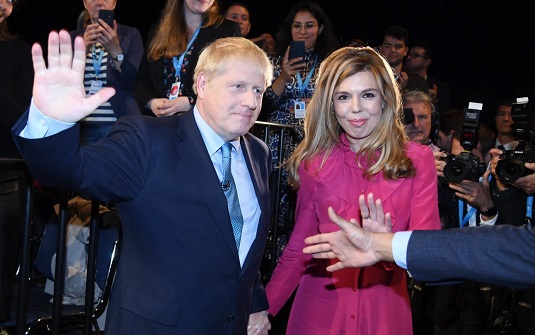
He notes Labour are banging the drum for all their might, but there is a feeling among the Westminster cognoscenti this isn't working. And the sense is largely correct. For honourable members on the PLP's benches, they might get a frisson of satisfaction cosplaying the golden years between Black Wednesday and May 1997 - sans the double-digit poll leads - but the assumption sleaze alone is going to turn heads is a desperate one. As Rawnsley rightly notes, the Prime Minister's laziness and what we might euphemistically call "corner cutting" is baked in. In fact, his contempt for the rules is one facet of his appeal. In case you hadn't already noticed.
What gives then? Rawnsley declares the sleaze allegations aren't shaking confidence in the government because "voters are generally more tolerant of sleaze when they are feeling good about their own lives and much less forgiving when they are miserable." Presumably, the government are going to do something wrong, their authority will avalanche, and the swing voters will swing over to the other side if enough of them don't have the feel good factor. Until then, nothing can be done. Rawnsley will keep filing copy. 1,500 words every Sunday signifying nothing.
In this article we find everything wrong with conventional political commentary. The gesture to inside knowledge, a bit of wiseacring, but at the end of it there is no new knowledge here. Rawnsley has done nothing to illuminate the workings of politics, let alone offer an explanation for the mysterious non-effects of Tory corruption on the polls. His account renders his object mysterious, unknowable, unfathomable. The complete opposite to what political commentary should do.
Getting to the bottom of the mystery isn't too difficult. Britain's political economy is badly polarised around the crucial axis of property ownership. The have nots are disproportionately young and in work. The haves are disproportionately older and mostly retired. The political consequences of this inescapable fact is nevertheless invisible to most of the political establishment and their media lackeys. All, except for Boris Johnson and Tory strategists. Because property ownership tends to atomise, individuate, and stir up a basic anxiety about its possible loss, in the absence of other institutions and affiliations their social positioning tends to encourage a preference for scapegoating, populist, and authoritarian politics. The culture war stuff, Brexit, the faux anti-elitism variously appeals to this cohort of voters while Johnson, like Dave before him, ensures they're shielded from the consequences of the Brexit mess, the Coronavirus depression, and whatever "sacrifices" have to be made in the post-pandemic era. All of this is quite deliberate. There is nothing accidental about the Tories' frequent forays into this territory.
This does not work among the young because, for one, continued Tory support by the old is purchased by making life shit for them. Johnson doesn't care that 80% of jobs lost between March 2020 and March 2021 was by the under 35s, because they're not about to vote Tory anyway. Not only have the Tories made it clear that they should pay the costs of the pandemic, Brexit, and before both their austerity programme, the young are culturally much more impervious to Tory scapegoating, racism, and divide-and-rule. Hence why in Scotland younger people are much more likely to support the SNP and, despite Keir Starmer's best efforts, Labour in England and Wales.
The fact of this division, how our apparent generation war is a consequence of the decomposition and recomposition of class relationships, and the accumulation of property by older people who entered the market when housing was much cheaper and plentiful, has to be the starting point of any analysis of politics. Understanding electoral dynamics, parties' mass support, the problems of so-called apathy, the ratings of party leaders, pretty much everything about politics since 2015 rests entirely on the extent to which the new class politics condition and shape it. That the reality of politics doesn't merit a passing thought in Rawnsley's analysis, let alone among the rest of the bourgeois press pack, should tell you how distorted, partial, and useless their commentary is.
Image Credit
Saturday, 24 April 2021
The Myth of Tory Genius: A Case Study
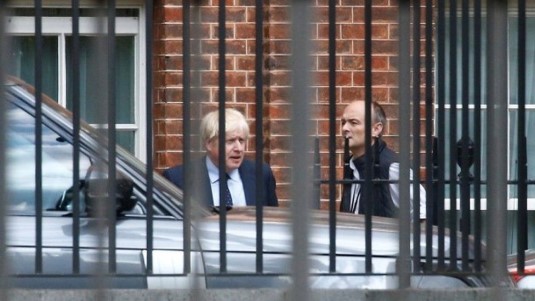
Having learned offence is the best defence from Lynton Crosby, Johnson's posse mounted the fightback! Working towards his feckless leader, from the pages of the Mail on Sunday Dan Hodges amplified Downing Street's initial response about the hunt for "redthroat", the supposedly Labour-loyal insider passing juicy stuff to the Opposition, who then forward it on to the hacks. He points the finger at a civil service looking at recovering its position following the heart attack of Dominic Cummings. And besides, with a leader as lazy as Johnson it falls to the permanent staff of state to ensure the machinery doesn't seize up out of neglect. Why not make a power grab if the boss is asleep on the job? Sadly for the likes of Hodges, there's no helping some people. Leaving it at this might have been job done. The ground was being prepared for a new enemy within, a nebulous but disloyal Sir Humphrey type that might make for a new "blob" that could be targeted for later anti-elite populism. The right wing press could contrive small scale hysteria about leaks, and Johnson would get plaudits for stepping in and proving himself an effective leader. Instead, the self-styled masters of the universe in Downing Street elected to make matters worse.
"Sources close to the Prime Minister" put it about the media that the actual source of the leaks was Cummings himself. In the first place hoping a new row over leaks would focus Westminster chat, and therefore coverage, away from corruption to the he-said-she-said psychodramas that fascinate the hacks but are seldom followed by the punters, this one badly misfired. No one's fool, Cummings replied in kind with a statement of his own. He claims Michael Gove's terrifying mini-me, Henry Newman was behind the so-called "chatty rat" leaks about the timings of the second lockdown and that Johnson derailed an investigation by the cabinet secretary because Newman is Carrie Symonds's best mate. He then goes on to say Johnson was all for tapping up Tory party donors to renovate his flat, saying this was "unethical, foolish, possibly illegal and almost certainly broke the rules on proper disclosure of political donations." To rub salt into the wound, Cummings called for a parliamentary inquiry into these matters. Ouch.
So, instead of Westminster soap opera we get a renewed focus on backscratching, cronyism, and attempted corrupt dealings. Well done the underlings. And the spinners can now look forward to Cummings's line, "It is sad to see the PM and his office fall so far below the standards of competence and integrity the country deserves" quoted back at Johnson by a gleeful Keir Starmer at any Prime Minister's Questions, and feature on Labour leaflets aplenty between now and the next general election.
It goes to show, again, that the Prime Minister is no master strategist and the people he surrounds himself with are hardly geniuses. This is just a reminder that there is nothing mystical about the Tories, and they are not overly blessed with preternatural talent. They only appear invincible because they understand who are likely to vote for them better than Labour knows its own electorate, and they are overly reliant on the cushion of institutional advantage afforded by their close relationship to print and broadcast media. The Tories are entirely beatable, and especially so if the time is taken to patiently study their tactics, strategies, and trajectories.
Image Credit
Local Council By-Elections April 2021
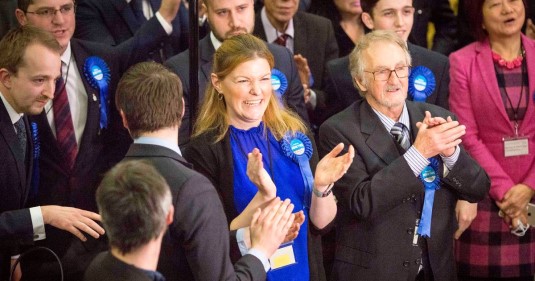
Party
|
Number of Candidates
|
Total Vote
|
%
|
+/-
March |
+/- March 20
|
Avge/
Contest |
+/-
Seats |
Conservative
|
3
| 1,218 |
38.2%
| +13.2
|
+2.6
|
304
|
0
|
Labour
|
4
| 1,121 |
35.1%
| +15.2 |
+19.6
|
280
|
+1
|
LibDem
|
1
| 230
|
7.2%
| +1.9
|
-24.3
|
230
|
0
|
Green
|
0
|
0
| |||||
SNP*
|
0
| |
0
| ||||
PC**
|
0
| | |
0
| |||
Ind***
|
4
| 587 |
18.4%
|
+4.9
|
147
|
-1
| |
Other****
|
2
|
1.1%
| +0.7 |
-1.0
|
18
|
0
|
* There were no by-elections in Scotland
** There were four by-elections in Wales
*** There was one Independent clash
**** Others this month consisted of Propel (19, 16)
The scraps left over before the by-election fest of 6th May, where we can look forwward to well over 300 contests alongside the usual round of local authority elections. What fun! Nothing too much can be said for this month's performance considering the contests were so few and all in Wales, though I will note how peculiar it is to not have any Plaid Cymru representation at all. But still.
House keeping note. As we didn't have much in the way of by-elections last year all year on year comparisons will be with March 2020. At least until when October swings round seeing as Scotland was so kind as to provide us with a comparator last Autumn.
1st April
Monmouthshire UA, St Kingsmark, Con hold
8th April
Torfaen UA, Abersychan and Cwmavon, Lab gain from Ind
Torfaen UA, Cwmyniscoy, Lab hold
Torfaen UA, New Inn, Con hold
Image Credit
Thursday, 22 April 2021
The Tories' Paralysing Procrastination
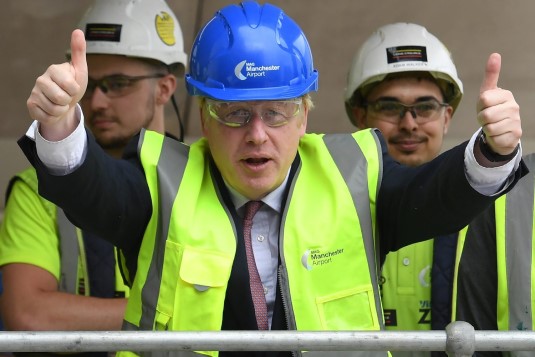
It is the case Johnson delivered on his main pledge and secured the most ruinous Brexit he could, there are side issues where promises were made and barefaced lies were told. The border in the Irish Sea currently reminding official politics of a past it would rather bury isn't supposed to exist, if you recall Johnson's selling of his deal 18 months ago. We've had promises about "levelling up", which so far means relocating a couple of hundred Treasury jobs from London to Darlington. He promised a pay rise for NHS workers, and then rowed back. And his commission on racial inequality was so appalling the UN were moved to condemn it.
The making and breaking of promises is usually the making and breaking of government, but Johnson and the Tories have got away with it so far. Yet why do they do it, and how has this persistent say-one-thing-and-do-another become such a feature of their politics? Well, there's the approach to Tory statecraft Johnson inherited from Dave and Theresa May. For the coalition years, the Tories lived from headline to headline, as obsessed about what the editorials were saying as Blair, Mandelson, and Campbell were in their day. For May, her approach to Brexit was driven by one overriding priority: keeping the Tories from disintegrating completely. Her twists and turns, painful defeats, repeated self-immolation, and eventually her resignation at least reflected the imbalances and shifts in the parliamentary party itself. Cirumstances imposed themselves. But what of Johnson? With an 80-seat cushion, all the institutional advantages, and a badly trailing opposition, why is he acting in a similar way and throwing out promises he has no intention of keeping like confetti?
Well, his record as London Mayor didn't depart from the formula, so you might put it down to personality as well as political inertia. But equally, there's a general paralysis. With Brexit done and the vaccine programme going well, the ghost of Tory futures is menacing proceedings and rattling its chains. For example, Johnson has his (on paper) programme of Tory modernisation with research budgets and tunnels to Ireland, but actually moving on his much evoked "priorities of the British people" is easier said than done. Consider some of their priorities, like developing an economy not over-reliant on low paid jobs. Or ensuring people can eat if they become unemployed. Or ending to evictions during the pandemic and action on landlords. Or the acceleration of house building, including freeing up councils to invest in building new stock. The Tories are absolutely nowhere because these harm the perceived and actual interests of their coalition, and so we're reduced to Johnson saying a lot while delivering very little. This is almost entirely politics as artifice, of policy produced for rhetoric's sake instead of the other way round. Of promising action in lieu of action, and hoping the overrepresented core support carry on voting Tory as they have done.
One of the advantages of this is the impression of busywork, even if it keeps kicking the can down the road. Contrary to the charges often levelled at the Tories for living in the past, they completely inhabit the moment, of preserving serenity now at the price of strife tomorrow. May's and Johnson's Brexit negotiating tactics were entirely subordinated to immediate concerns, and any problems arising can be dealt with later. And Johnson can now promise firm action on rebalancing the economy and committing the UK to ambitious emissions targets knowing it isn't likely he'll be the one doing the detailed work and negotiation of interests this requires. It's almost like there's a low-level war between present Tories and future Tories, of putting off and fighting shy of the inevitable. This cannot be ducked forever. There will come a time when they can no longer rely on their present coalition to get them into office, and as this support is purchased at the price of alienating everyone else, their viability as a party of government comes into question. For the moment, they're content with letting the long grass hide what lies in wait. And in Boris Johnson, the most dishonest, lazy, and most cynical Prime Minister in post-war British history, they have settled on a figure completely equal to their political procrastination.
Image Credit
Wednesday, 21 April 2021
Labour's Right Wing Opportunism

The certitude the leadership on the right track is confirmed by their current positioning. These last couple of weeks, for example, should be spring time for a Labour Party prepared to push a bit of left populism. Instead, the opportunities afforded by galloping Tory corruption is passed up in favour of banging on about "sleaze", as if this would rekindle Sun readers' memories from 30 years ago and look on Labour with a beatific smile. And there was the seen off attempt to form a super league. Labour night have agitated a bit more about this and talked up its plans for fan ownership and control, but why bother when making the case for something positive is too hard? Though one has to be fair to our hapless leadership and acknowledge how they have done some actual opposition. Opposition from the right.
Consider John Healey's response to the sacking/resignation of Tory heart throb, at least to some Labour MPs, Johnny Mercer. The "principled" stand Mercer had taken was the government's refusal to grant legal immunity to armed forces personnel who served in Northern Ireland. Doing so would quash the trial of two ex-servicemen due in the dock next week for the extra judicial killing of an IRA commander in 1972. For his part, Healey praises Mercer's resignation letter and slams Johnson for "abandoning" veterans. Yes, holding agents of the state to account is not the done thing under Keir Starmer's leadership. It would be astonishing if Dear Keir hadn't already prepared the ground for Labour's right wing opportunism by abstaining on the spycops bill, attacking the Tories for being soft on crime, opposing corporation tax rises, and putting as much distance between him and anything smacking of left Labourism. A pathetic spectacle.
And one to doom Labour further. As political science is the client discipline of official politics, LOTO doesn't even have to turn to radical rants to understand what is happening to them. Take the so-called spatial model of voting, for example. As an application of rational choice theory, it makes an assumption voters have policy preferences and are most likely to support the parties in closest proximity to them. Parties react to this information, so the assumption goes, by pitching their tent as near to where most voters are on a range of the most salient issues. Hence Tony Blair and his heirs and epigones pining for the centre ground. In as much the Third Way's envelope of hot air carried theoretical balast, it was this belief carried over from rational choice. And so you can see what Dear Keir is now attempting to do. Seeing as he's fond of quoting the Line of Duty, he's been sucking the diesel of Graun journos' northern safaris, and the anti-working class bollocks peddled by Claire Ainsley. They - erroneously - claim Labour's core support is fundamentally socially conservative, and so the way to win them back is by positioning Labour close to them on cultural issues. Hence the cringe of plastic patriotism is in, with the no-reverse-gear of an authoritarian without authority, and a straightforwardly grim celebration of the police and the military just as they're coming under increasing scrutiny.
Yet, it's not as easy as all that. Spatial models might be simplistic, but unlike insulated party leaderships they do have to genuflect to political realities to retain some explanatory power. Refinements to the model since the 1950s recognise that voters are rarely free-floating bundles of issues but prefer one side of the political fence. You're either for or against more money for the NHS, for or against more coppers, for or against Brexit. The average punter is also more than capable of identifying parties as being relatively coherent. This, at least where political science is concerned, is why parties have values and ideologies. They serve as short cuts to understanding a party's likely position on an issue. If in the recent past the Tories were attacking the welfare state and pushing tax cuts, one can assume they're unlikely to favour funding schools properly. It's also why the Tories and their friends and comrades on the Labour right expended so much energy associating Jeremy Corbyn with terrorists, racism, the forced collectivisation of agriculture, and muesli. One might like his plans for green industry, but less keen on the Hebridean
How does this play out now? Keir Starmer thinks flag waving and, um, truncheon stroking will grant him permission to be listened to among the millions of self-described life-long Labour voters who haven't voted for the party for years. Yet while canvassers are reporting less hostility on the doors, it seems Keir's media projection has beamed into living rooms and onto mobile phones, and is stirring up apathy everywhere he appears. This is because many of the voters Labour lost are not stupid. They might find him less polarising and a bit boring, but he's already lost them because they know he led the charge against their referendum vote. And so Labour's positioning as more Tory than Tory looks like a gimmick. There's a wall no amount of inauthentic and desperate-looking posturing can bring down, no matter how close Keir is to them on patriotism and genuflecting to the authoritarian state. To them, Keir Starmer and the shadow cabinet are a bunch of well-meaning wets who'll pander to you one moment and disregard your aspirations the next.
As unlikely as it might seem, the position is recoverable and Labour could make up for lost ground. This means dumping the culturalist nonsense and start pivoting towards interests. And yes, this means doing more than defending the NHS and asking for a 2.1% pay rise. If Labour were serious about winning (which, historically, it hasn't been), it might want to reflect on why Labour did unexpectedly well in 2017. And the reason is obvious: because the party spoke explicitly to interests that had hitherto been crowded out of mainstream politics. Naturally, 2021 is different and the build up to the next election will have its own issues, but the pandemic has sharpened the inequalities and tensions present before 2020. The Tories are responding to them with their own take on the big state and "levelling up", but are leaving politics wide open for the left to articulate the interests they're neglecting and conspicuously working against. Which are, of course, the interests our class has in more housing, decent pay, and the means to enjoy a full life. There's a window here for Labour, even for a politics as top down and grey as so-called "Starmerism".
If past performance is anything to go by, the leadership are sure to give it a miss.
Image Credit
Tuesday, 20 April 2021
The Super League's Own Goal
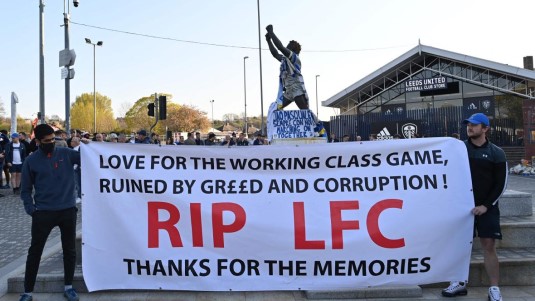
One of my comrades who follows men's footy has often said England's sub-par performance on the pitch is because the national side fields a team of millionaires for whom there is no consequence nor incentive to do well. What the new super league promises is the formal institutionalisation of this dreary state of affairs. The league is not a response to grassroots enthusiasm or competitive pressure, except to say it's an attempt to generate a new round of broadcast rights and sponsorship deals which won't be shared with other top flight teams. The billionaires who see their clubs as nothing but cash cows arrogantly assume the mass audiences for European football in Africa, the Arab world, and East Asia - the key emerging markets - will still be interested even if domestic fans desert the clubs.
Your Glazers, Kroenkes, and Abramovichs might think the punters don't care, but this misrecognises the appeal of not just footy but sport generally. The action of a game or match is just part of it. The excitement lies in the fundamental uncertainty, of the risk of failure and the fickle play of luck and chance. Even sports entertainment that is totally pre-packaged and scripted, like wrestling, relies on contrivances that make it appear as if no bout is a foregone conclusion - even though the audiences themselves are in on the fix. Wining and losing have consequences: trophies and titles are always aspirational, but the struggle to maintain one's standing in the rankings is the meat and gravy of football. Games might always be games, but it's the stakes invested in them that matter, which probably helps explain why friendly matches never generate as much of a buzz. The super league might have its own title, but there is no price for failure. Coming at the bottom of the league does not mean relegation, nor are there any routes into the league. It is entirely closed up, a hermetically sealed panic room insulating self-styled elite clubs from the competition. This is nothing other than an attempt at an oligopoly.
On paper, capitalism is based on a free market where firms compete with one another for sales and customers. In practice, businesses are parasitic structures whose drive to accumulate demands certainty. This conditions the authoritarianism if not despotism within the firm itself as it struggles to control all the factors under its purview, and its relationship with similar firms and the state tend toward softening the edges of competition and creating a more benign environment for its operation. The impulse toward certainty means where capital invests in activities left up to chance, like sport, we see huge investments in training and coaching, facilities and marketing, and the splashing out on star players to give their property a competitive edge and a greater guarantee of the profits. But inevitably, the fabric of the game suffers from this ingress. The relentless pressure for results can demotivate players, while around the edges efforts are made to rig the system to keep the profits flowing. The super league is one such strategy, an attempt to guarantee profits for the billionaires while removing the threat of consequence.
Naturally, no one is forcing our billionaires to do this. The super league is not the sum total of Europe's top flight clubs. But we see similar behaviour time and again, of the personifications of capital undermining the basis of their own system. Whether it was the Conservative-Liberal Democrat coalition sucking demand out of the economy with their programme of public sector cuts, causing the recovery from the 2008 crash to take longer than was necessary. Or hip-happening neighbourhoods emptying of residents as holiday let businesses market them on the basis of the dynamic and captivating local culture an destroying the original attraction in the process, or indeed capital's search for profits undermining the basis of life on this planet with climate change, deforestation, and mass extinction. Money grubbing has long threatened the people's game, and will continue to do so even if the super league is seen off.
Image Credit
Sunday, 18 April 2021
Deleuze and Guattari Vs BuzzFeed

Businesses are, of course, businesses. They have to turn a profit or they go down the tubes. No investor, save a well-heeled hobbyist, is going to keep chucking money at something if there's no return to make good the capital advanced. And BuzzFeed are treading the beaten path of most media organisations these last 20 years: cut the staff, somehow do more with less, fill the publication or outlet with low cost content, and hope the money will flow. This isn't all BuzzFeed are doing, and in this interview from last year, founder Jonah Peretti was in the process of diversifying its income streams by muscling in on the digital middleman market dominated by Google. Also among the plans mooted were "paid social" (i.e. closed social network spaces), assisting streaming services (code for becoming a TV production company) and a better data-driven approach to audience capture. How's it going? Peretti forecast a modest profit last November, but its losses elsewhere are a significant drag.
Peculiar then how an internet business exhibiting very normal capitalist behaviour has acquired the supercool glamour from its association with the, um, radical anticapitalism of Gilles Deleuze and Felix Guattari. As part of the 2013 hype machine around BuzzFeed's emergence, some were making links between the viral content and listicles that were (and remain) BuzzFeed's stock-in-trade and the materialist metaphysics of their philosophy. Asked about Deleuze and Guattari's influence, Peretti was evasive, though for some the tantalising parallels were there. In a paper he wrote for college and subsequently unearthed, Peretti argues the circulation of images in late capitalism is so rapid it produces a world of discontinuous time. Using MTV as his model (when it used to run music videos), their flickering, speeding succession provokes an ego formation that establishes lines of identifications between what is seen, what is internalised, and, in all likelihood, what is subsequently purchased. This is well understood by marketing departments the world over, and has been the case for approximately a century. What is different about now is the rapidity with which this takes place, and the weakness of these identifications. They have become entirely fleeting.
This is all very well, but it doesn't have a great deal to do with Deleuze and Guattari. In the paper, Peretti sets up an encounter between Anti-Oedipus and Fredric Jameson's 1983 essay, Postmodernism and Consumer Society, noting - like the good fan of Adorno Jameson is - how emergent postmodern culture didn't lend itself to providing the critical resources for taking on capitalism. Deleuze and Guattari are far more hopeful. The social production of social relations, their ceaseless emergence, splitting, conjoining, connecting, surviving, and shiftings in and out of abeyance, is a complex fizzing mess at all times, always potentially and immanently productive of more social production. This productive character of the social is analogous to the shape and movement of all matter, all life - a point made a century earlier by an old friend of ours. In Anti-Oedipus, the object of their critique on this basis is how desire, which is Deleuze and Guattari's term for this will-to-produce, is stymied, broken, thwarted, and cajoled into Oedipalisation. Desire is reduced to the unconscious and its flows are dammed and redirected through the Oedipal triangle to produce the forms of authority-accepting individuation capitalist societies are founded on. There is nothing natural or inevitable about Oedipalisation, and other forms of human life are possible, hence why they valorise the schizophrenic who experiences life in defiance of Oedipal terms and prescription, but suffers because of it. As far as Deleuze and Guattari are concerned, Oedipus is an apparatus of capture. It catches and tries pacifying desire, and psychoanalysis reinforces this economy of desire by naturalising it. However, as totalising as Oedipus aspires to be it is not totalitarian. The production of desire is always on escape velocity, and this is aided by the incoherences of the apparatus itself. In other words, Oedipus, its institutional weight, the refinements of medicalisation, and its violence is a best effort at containment and capture, not a seamless one.
Class societies have worked in a not dissimilar fashion. As social fields, they have worked as containers of social production through conquest, enslavement and enserfment to provide territories, or spaces for more or less regulated behaviours with sanctified punitive sanctions at their disposal. The famous opening passages of Foucault's Discipline and Punish where the hapless Robert-François Damiens was utterly obliterated reminds us of how challenges to the ancien regime were dealt with: by opposing the power of the sovereign to the powerlessness of the individual. Capitalism, however, was built on the ruins of despotism. The collapse of feudalism, particularly in England, saw the dissolution of the feudal obligation and the expropriation of the peasantry. They were turned into a class of propertyless labourers increasingly dependent on the market for the means of life and wage labour for the money to acquire it. Hence for Deleuze and Guattari, as capitalism emerged from the debris it proceeded by connecting two different deterritorialised flows - free labour and money capital - from which the further accumulation of capital, the growth of markets, and the proletarianising assault on persisting communal and feudal relations of production has spread. Because accumulation is capital's raison d'etre, its history of expansion and colonial violence has been accompanied by its deterritorialisation of capitalism's outside (the liquidation of rival modes of production as per the observations in the Manifesto) to bring it inside, to bend the sociality of others to its own abstract logic.
This deterritorialisation is corrosive of social relations, even those capital has erected. The tendency of capital is to the subordination of all aspects of the social to itself, of transmuting the value of things to the quantification of the balance sheet. Yet, simultaneously, capital is a relationship that rides the potentials of social production only so far. As Oedipus distorts and diverts desire, capitalism generates its own territorial spaces. As Deleuze and Guattari observe, "Capitalism institutes or restores all sorts of residual and artificial, imaginary, or symbolic territorialities, thereby attempting, as best it can, to recode, to rechannel persons who have been defined in terms of abstract qualities" (Anti-Oedipus, p.34). Consider post-war history in this country, and the two broad varieties of capitalism we have experienced in that time, and how the passage from one to another redefined permitted politics by propaganda, police baton, and (awkwardly) mass consent. 40 years of neoliberalism has been a great exercise in deterritorialising the social fabric by tearing it up, and redirecting social production around the contours of a new territoriality of the atomised and acquisitive, which includes the direct involvement in and profiting from new axes of exploitation around the production of identities.
Where then does BuzzFeed sit into this critique of capitalism? Well, for one we can put the idea it's a Trojan horse, a business whose business is disassembling business out to pasture. It is neither an agent of capitalism's destruction nor a communist plot, but a banal company chugging along the circuits of capitalist banality. The illusio (Deleuzio?) of radical significance attached to it, particularly the relationship to Anti-Oedipus simply isn't there. Save BuzzFeed conforming to the diagrams of capitalistic capture sketched out in the book. Try as you might, there is nothing between Peretti's 1996 paper and 'Stuck On What To Wear Now We're Allowed Out? Here's 41 Suggestions'. Now, had he written on Deleuze's prescient 1990 Postcript on the Societies of Control, a much stronger claim could be made for a meaningful relationship. Among the many ideas packed into this short text is the notion of 'dividuals', a sub-individual category that states and business divide us into data points for their own purposes. A nice anticipation of the way social media platforms use big data to sell targeted advertising, which of course BuzzFeed is now trying to lever so they get a bigger slice of the marketing pie. But Peretti's paper sticks with the Freudian terms of ego formation in the relationship between consumerism and identity. Had he instead used the dividual as a jumping off point for thinking about the series of stunted, partial subjectivities capitalism generates to contain and capture, then we have something worth talking about. But he didn't.
It's time to put this claim to bed and stop giving this increasingly irrelevant peddler of clickbait the benefit of a sophisticated radical gloss. There is no correspondence, causation, or line of flight between Deleuze and Guattari's Anti-Oedipus and BuzzFeed any more than there is between major corporations and its cadres of managers who, in their previous lives as university students, might have studied and written essays on Marx. As revolutionary thinkers and activists, they deserve so much better than to be paired with this grasping, failing incubus.
Image Credit